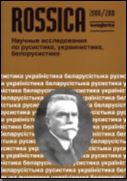The Slavism of Karel Kramař at the Turn of the Twentieth Century
The Slavism of Karel Kramař at the Turn of the Twentieth Century
Author(s): Stanley В. WintersSubject(s): Political history, Cultural Anthropology / Ethnology, 19th Century, Pre-WW I & WW I (1900 -1919), Interwar Period (1920 - 1939), Identity of Collectives
Published by: AV ČR - Akademie věd České republiky - Slovanský ústav and Euroslavica
Keywords: Karel Kramař; Slavism; 19th century; 20th century; politics; identity; Czechoslovakia;
Summary/Abstract: The youngest of the Young Czech deputies elected in 1891 to the Austrian Reichsrat was Karel Kramař. A confirmed Slavic enthusiast since his youth, he became the most influential figure in Czech political Slavism in the two decades before World War I. In the late eighties and early nineties, when Kramař was a political neophyte, his Slavism assumed a rather complex and pragmatic form. It blended Czech patriotism and panslav feeling with a high regard for Russia, but avoided blind russophilism and did not counterpose Russia to Austria as a rival center for Slavic allegiance. Kramař hoped that the Austrian half of the Habsburg monarchy would be restructured along federal lines, with self-government for the Czechs on a par with Hungary; later he broadened this concept to include autonomy for the other nationalities of Austria. So far as the Hungarian half was concerned, Kramař acknowledged “sympathy” for the Slovaks but did not envision ending Hungarian domination through a federal reorganization similar to that which he wanted in Austria. He proposed to reach his goal through a Slavic policy employing both moderate and militant tactics: moderate through the formation of a “Slavic club” in parliament that would reform Austrian internal conditions by means of legislation, and militant though open agitation in behalf of all- Slavic cooperation, stressing “as a last resort,” should conventional methods fail, “an entirely panslavic anti-Austrian opposition.” Kramař did not restrict his Slavic policy merely to securing Czech autonomy or solving purely Austrian problems; however, his obviously austroslav predilections made him a target for attacks from the russophils on the Young Czech newspaper Narodni listy and the eccentric Young Czech deputy Jan Vašaty. Kramař exemplified new qualities among liberal partisans of Czech Slavism: knowledge, restraint, and political adeptness. This was partly a product of his cosmopolitan education, including university study in Prague, France, and Germany, and of his wide travel throughout Europe. From his father, a one-time farmer turned building contractor and an ardent Young Czech, he received not only enough money for a comfortable life style but also love of the Bohemian landscape and of Czech national traditions, and loyalty to the Young Czech party.
Journal: ROSSICA
- Issue Year: V/2001
- Issue No: 1
- Page Range: 3-7
- Page Count: 5
- Language: English

